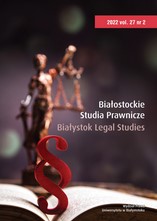Restrictions on the Right to Vote in the Pandemic during the Election of the President of the Republic of Poland in 2020
Restrictions on the Right to Vote in the Pandemic during the Election of the President of the Republic of Poland in 2020
Author(s): Joanna Kielin-Maziarz, Krzysztof SkotnickiSubject(s): Constitutional Law, Government/Political systems, Electoral systems, Health and medicine and law
Published by: Temida 2
Keywords: active election rights; elections; election campaign; election objections; postal voting; presidential elections;
Summary/Abstract: In 2020, presidential elections were due to be conducted in Poland. Despite the COVID-19 pandemic, it was decided not to introduce a state of natural disaster and, as a consequence, postpone the elections but to execute them on the grounds of episodicact. On the basis of the first episodic law, from 6 April 2020, the elections did not take place because they were completely unprepared. This law had many flaws. The elections were to be purely postal, so voters had no possibility of choosing which method to use to vote. The law’s entry into force on the eve of the election meant that voters were disoriented until the last minute and did not know how they could vote, whether they would receive election packages, where they would have to deliver return envelopes with a ballot paper and were not sure whether their vote would be counted. The second episodic law, of 2 June 2020, did not contain so many flaws, and voters in the country could decide for themselves which method to use. However, voting was very difficult abroad, and in 20 countries was not carried out at all. There were also only three days to submit election objections. However, above all, the lack of impartiality in the public media, especially public television, which supported the candidate promoted by the ruling majority, limited voters’ right to access truth-based information on public matters, candidates and their political programmes. These circumstances prompt us to consider whether the presidential elections in Poland in 2020 met the constitutional requirement of universality, equality and secrecy, and whether they were reliable and fair. Do they therefore serve to legitimize the office of the president of the Republic of Poland?
Journal: Białostockie Studia Prawnicze
- Issue Year: 27/2022
- Issue No: 2
- Page Range: 177-192
- Page Count: 16
- Language: English

